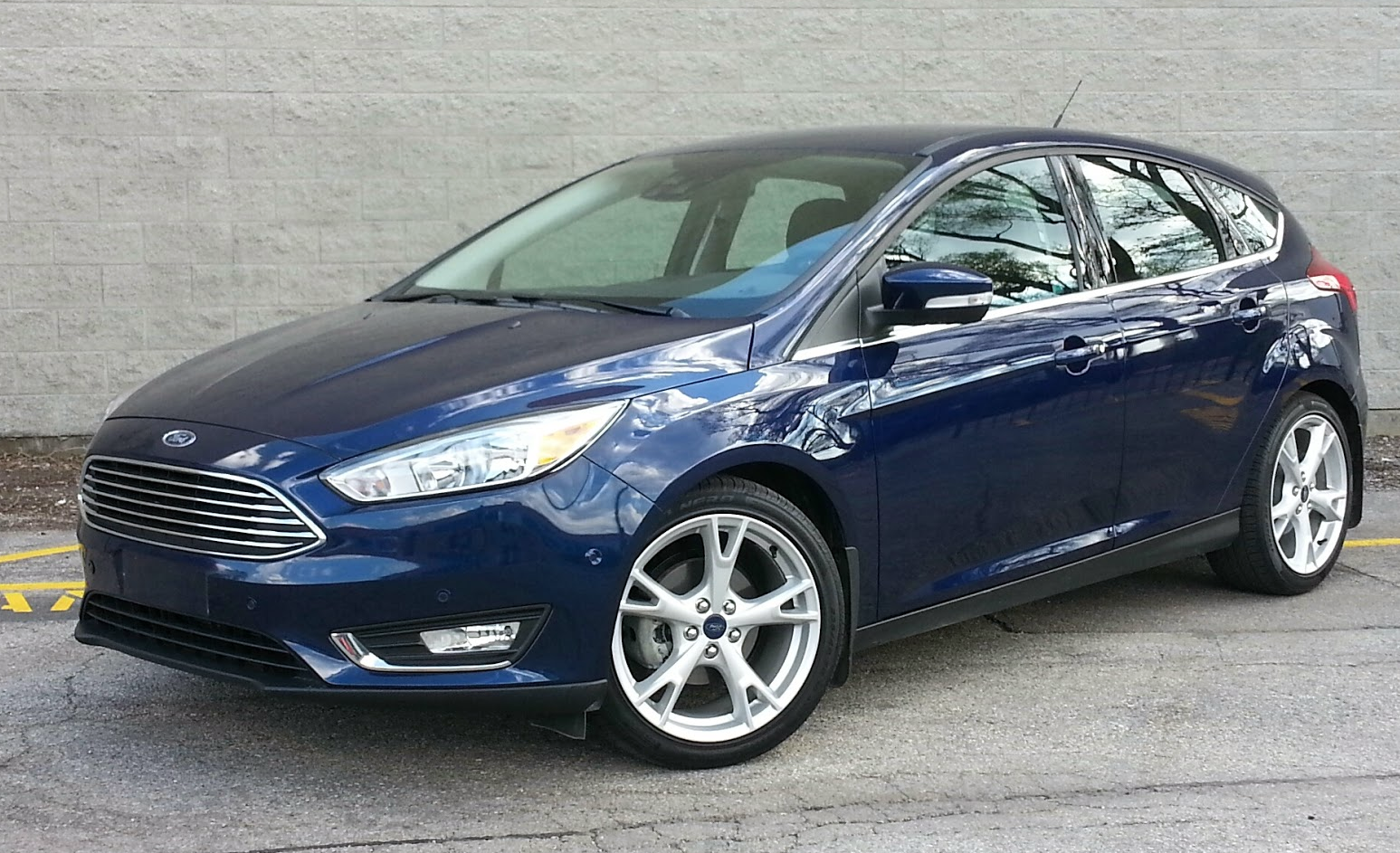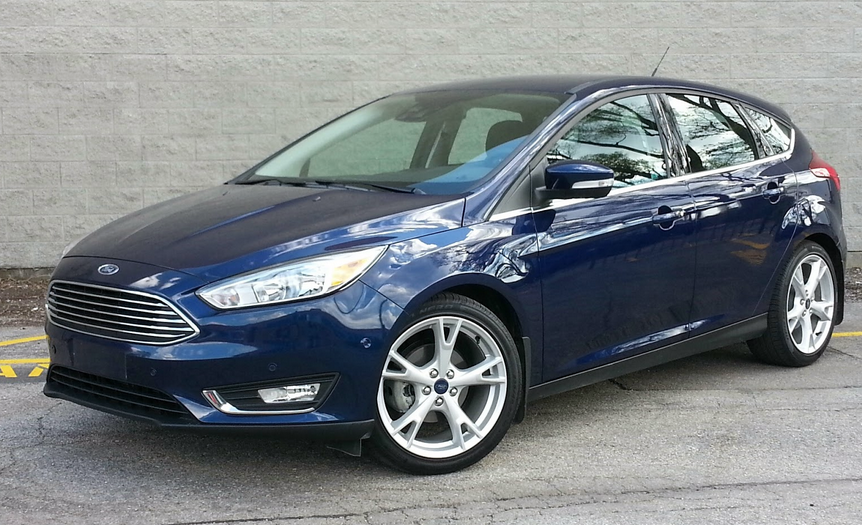
2016 Ford Focus Hatchback Titanium
Class: Compact Car
Miles Driven: 202
Fuel Used: 8.6 gallons
Real-world fuel economy: 23.5 mpg
Driving mix: 85% city, 15% highway
| CG Report Card | |
|---|---|
| Room and Comfort | C+ |
| Power and Performance | B+ |
| Fit and Finish | A- |
| Fuel Economy | B+ |
| Value | B- |
| Report-card grades are derived from a consensus of test-driver evaluations. All grades are versus other vehicles in the same class. Value grade is for specific trim level evaluated, and may not reflect Consumer Guide's impressions of the entire model lineup. | |
| Big & Tall Comfort | |
| Big Guy | C |
| Tall Guy | B- |
| Big & Tall comfort ratings are for front seats only. "Big" rating based on male tester weighing approximately 350 pounds, "Tall" rating based on 6'6"-tall male tester. | |
EPA-estimated fuel economy: 26/38/30 (city, highway, combined)
Base price: $23,725 (not including $875 destination charge)
Options on test car: 18-Inch Wheel and Tire Package ($825), Technology Package ($795), Cold Weather Package ($195), navigation system ($795), Active Park Assist ($395), Exterior Protection Package ($245)
Price as tested: $26,775
Quick Hits
The great: Sporty feel, upscale cabin
The good: Improved Sync 3 media-interface system
The not so good: Cramped cabin
Check out Consumer Guide’s Compact Car Best Buys
Damon Bell
The 2016 Ford Focus is largely a carryover from last year, save for two notable exceptions: The available turbocharged 1.0-liter EcoBoost engine can now be had with a 6-speed automatic transmission (it previously came only with a 6-speed manual), and Ford’s new Sync 3 touchscreen infotainment system replaces the previous MyFord Touch system.
We haven’t yet had the chance to sample the 1.0-liter engine with the automatic, but the switch from MyFord Touch to Sync 3 is a welcome one. In addition to its smartphone-like swipe and pinch gesture capability, the Sync 3 system’s jumbo-sized buttons and simpler, high-contrast menu layout make it much easier to use than the MyFord Touch system. We frequently experienced glitchy behavior and slow response times from MyFord Touch systems we’ve tested in the past, but our initial experiences with Sync 3 have revealed no such issues.
Test Drive: 2016 Honda Civic Touring
Our test Focus came in top-of-the-line Titanium trim, which includes such standard features as leather upholstery, leather-wrapped steering wheel and shift knob, keyless entry and starting, dual-zone climate control, heated front seats, heated mirrors with puddle lamps, and rear park-assist sensors. It was also equipped with the Cold Weather package (a heated steering wheel and all-weather floormats); the Active Park Assist self-parking system; and the Technology package, which includes automatic high-beam headlights, lane-departure alert, and a blind-spot warning system with rear cross-traffic alert.
The single priciest option, however, was the 18-inch premium painted-aluminum wheels and high-performance all-season tires. The big-inch rollers look great and had a negligible effect on ride quality, but practical-minded buyers might balk at the $825 surcharge.
With its crisp handling and responsive steering feel, the Ford Focus stands as one of the sportier entries in the compact-car class. It’s athletic enough to be satisfying in spirited cornering, but compliant enough to be pleasant in day-to-day commuting. The Focus is also one of the most substantial-feeling cars in its class, with a solid build structure that feels a bit more robust that many compact-car competitors. Doors close with a satisfying “thunk,” and the rigid body structure is apparent from behind the wheel. The solid structure also helps make the Focus’s cabin one of the quietest in its class.
Test Drive: 2015 Mazda 3 i Touring
However, the Focus’s architecture also contributes to its greatest weakness–it’s simply not as roomy for occupants as other compact-car leaders. The front-seat area is just adequate for most average-sized adults, and the rear-seat legroom is tight enough to be uncomfortable for all but kids and pre-teens, and downright unusable for tall folks. Compact cars aren’t known for having particularly spacious back seats, but even by the standards of its class the Focus comes up short. If you regularly need to haul grown-ups in the back seat, a Focus might not be for you.
Other than the subpar backseat space, the Focus’s interior is a pleasant place to be. The Titanium model we tested had an upscale feel inside. Overall, materials are high quality and nicely assembled, and most controls operate with precision. The Focus’s dashboard is more aggressively styled than many of its class competitors, but it’s still ergonomically agreeable for the most part.
The Focus’s standard engine is a 160-horsepower 2.0-liter 4-cylinder paired with Ford’s “Powershift” 6-speed automated manual transmission. The automated manual’s behavior might feel a bit peculiar to drivers who are accustomed to a traditional automatic transmission–there is some occasional minor “bogging” at low speeds, and shifts are sometimes more abrupt than a traditional automatic. We acclimated quickly, however, and didn’t find the transmission to be a demerit. The 2.0 is adequately peppy in everyday driving, and on par with most of the base 4-cylinders in the class. Fuel economy is competitive as well.
The Focus’s engaging driving character, robust infotainment system, and impressive build quality make it a compelling compact-car choice, but be sure to check out the rear seat on your test drive.
Test Drive: Toyota Corolla S Premium
